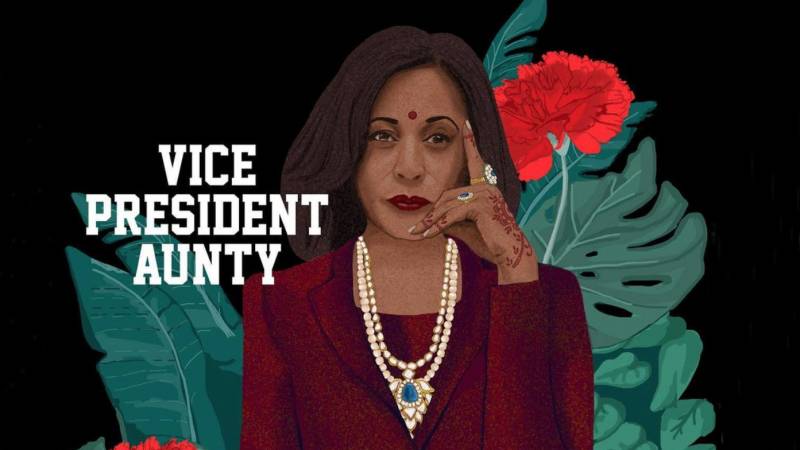Vice President-elect Kamala Harris is a self-described auntie. Just read the line in her Twitter bio: “Senator, Wife, Momala, Auntie.”
During the Joe Biden-Harris political campaign, Harris’ auntie status — as an elder female authority figure worthy of respect — was not only acknowledged, but made its way onto a sweatshirt as part of an effort targeting South Asian voters.
“Vote for Aunty” the text of the sweatshirt reads, with an image of Harris looking pensive — almost smirking. It’s the kind of face she might make when pausing during questioning someone like Brett Kavanaugh, who now is an associate justice on the Supreme Court. In the instantly iconic image, Harris also wears a bindi, and mehndi can be seen on her hand — both nods to her Indian heritage.
Harris has broken many barriers. And as the first female vice president-elect, she is also the first auntie in this role — a significance that is just beginning to be examined.
In her Aug. 19 speech accepting her vice presidential nomination, Harris gave a nod to her own Tamil aunties when she acknowledged her family, code-switching nonchalantly: “Family is my uncles, my aunts — my chitthis.”
“American audiences don’t know the meaning of chitthi, they would not even have noticed,” Harris’ uncle, Gopalan Balachandran, who is based in Delhi, told India’s ThePrint outlet.
But many did notice. And her auntie status sparked a sweatshirt design as well as a push to register and get out the AAPI vote.
Auntie as Icon — and Apparel
Asian Americans and Pacific Islanders are a fast-growing voter group, but also one that has had historically low voter turnout.
“That has changed dramatically in this election cycle,” wrote Tom Bonier, an adjunct lecturer at Howard University and CEO of TargetSmart, a targeted voter data organization, citing “an unprecedented surge in participation” among AAPI voters this year.
Perhaps having an iconic auntie on the ballot helped?
Hanifa Abdul Hameed is the East Coast visual artist behind that “Vote for Aunty” sweatshirt — and knows the power of the auntie figure. “Growing up in South Asian communities, I always called anyone older than me ‘auntie’ — as a form of respect,” Hameed told KQED.
“I remember growing up I would call my babysitters, who were Caucasian, ‘auntie,’ ” said Hameed (Colors of Honey on Instagram), adding that she feels uncomfortable calling someone older by their first name to this day.

